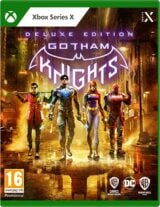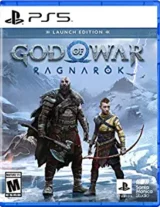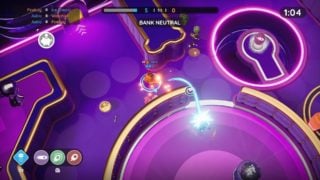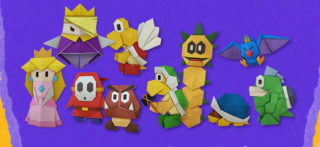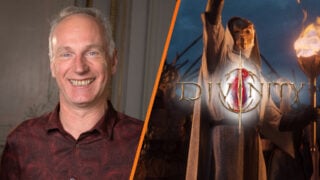Interview: Splash Damage partners with Google to launch new IP Outcasters
CEO Richard Jolly and product lead Lily Zhu discuss the studio’s latest multiplayer game

London, UK-based Splash Damage officially turns 20 next year. While the studio’s first commercial project was 2001’s Return To Castle Wolfenstein, the story of its formation goes back a few years earlier to the late 90s, when it started out as a small mod team after its founders met online playing Quake competitively.
They rose to prominence creating mods such as the popular Quake III Fortress and established Splash Damage with the goal of “wanting to kind of build multiplayer into a much bigger thing”, current CEO and co-founder Richard Jolly tells VGC.
From three friends coding in a bedroom, the studio has grown to employ over 300 people and it’s known for its work on some of gaming’s most iconic franchises, as well as original properties like Dirty Bomb.
During the 2000s Splash Damage developed Wolfenstein: Enemy Territory, Doom 3 (multiplayer) and Enemy Territory: Quake Wars. In the early part of last decade it made Brink and Batman: Arkham Origins (multiplayer), while over the past five years it has worked on Gears of War: Ultimate Edition, Halo: The Master Chief Collection and Gears Tactics, plus the multiplayer components of Gears 4 and 5.

Splash Damage has just revealed Outcasters, a colourful competitive multiplayer shooter which is coming first to Stadia. Ahead of its announcement VGC spoke to studio head Jolly, product lead Lily Zhu, and Stadia Games and Entertainment executive producer Justin Lambros, about the company’s journey and how it has led to its new IP. Here’s an edited transcript of our interview.
How did the idea for the game come about how long have you been working on it?
Jolly: This is kind of a unique thing for Splash Damage because I guess we’ve been making multiplayer shooters for almost 20 years now and one thing we’d never done until recently was have a game jam in all those years so we thought let’s try something different.
After just a week the team had a whole bunch of different things working, but this was the one that really resonated for us because we sat down and played it and thought wow, actually this is really good fun. And you know that feeling when you think you’re playing it for 10 minutes but you’re playing for two hours and you say ‘I’ll just have one more game, one more game.’
And I think it was really that core premise of the curve shot which is what we started with, because in traditional shooters there is this notion that you’re only really firing straight ahead and if you look at Splash Damage’s history, we started as a mod team, so back in 98/99 we met online from playing Quake competitively and as friends we formed the company from that, and I think that was really the core essence of wanting to kind of build multiplayer into a much bigger thing.

Back then I had a 56k modem and I’d be annoying my mum because she’d be wanting to use the phone and cut me off from a clan match, and who thought multiplayer back then was going to become the big balloon that it is now. And from that kind of essence I guess we started from that game jam with that core mechanic of the curve shot and then built on it as a platform, but then also took a lot of those learnings from a kind of purist multiplayer experience that you have from games like Quake, where you’ve got to know the levels intimately, you’ve got to know the cadence by which the power-ups spawn and where they’re spawning, and then the area of control and area of denial that you have using your projectiles to stop people. All of those nuances are in there but they’re somewhat disguised in this slightly more accessible presentation.
I guess for us we’re all getting a bit older now as a studio, we’re all getting responsibilities like children and just having to grow up, and we wanted to build something that harkened back to a lot of that purist game feel but in a far more accessible presentation, and in more bite-sized play sessions, to the point where, literally in Outcasters, you can be in and playing in seconds with Stadia. And your session length is anywhere between two minutes and five minutes, so you’re getting a very, very quick cadence of play and it’s super fun to have that experience and so I guess it really came back to that grounding of accessibility, but also broadening the play space a bit by making it much more easy to pick up and play.
How large is Splash Damage now?
Jolly: We are over 300 people now, so I think a lot of people probably think we’re a little bit smaller than we are, I think we’re probably one the bigger UK studios now. We’ve got quite a lot of games in development. We just released Gears Tactics at the end of April, but we’ve got a whole bunch of stuff in development.
Outcasters is billed as coming ‘first to Stadia’. When might that be and how long will the exclusivity period last?
Stadia representative: We aren’t disclosing exclusivity timelines at this moment.
What’s the business model for the game – free-to-play, full-price retail or somewhere in between?
Stadia representative: We don’t have business model specifics right now.
“It almost harkens back to the roots of being a mod team, where your whole process is about garnering feedback and changing and evolving, and we see this very much as a platform we can build new things on and on and we can run it for years.”
Can you tell us more about the curve shot?
Zhu: So like Rich mentioned earlier, the idea came about in the game jam, and it was pitched by one of our level designers, and we were like, this is insane and so different to the straight shot shooters we’re accustomed to at Splash. So we took it ahead. At the core of it it’s quite simple. Instead of firing straight it curves based on the line that you draw on the screen, but then just with that basic mechanic, very early on we already noticed it’s quite challenging, it’s very competitive, it’s quite easy to pick up and it’s refreshing.
Based on this we started developing new things to adapt the play and offer more variety, so one of the features that we have is the map pick-up, it’s like an in-session progression, there are these power-ups that spawn on the map that we specifically designed around curving shots, and these pick-ups can stack with each other and therefore change the way that the shot behaves. For example, we have a bounce shot which will bounce off a wall based on how you fire, and if you stack it, it will bounce twice, and if you stack it three times it will bounce three times, but we also have a variety of other pick-ups like the Split, which will explode into a lot of smaller shrapnel upon impact so when players start to stack these pick-ups with each other, the game starts to feel very fresh every time you engage with it because it has a random element, people will fight with each other differently, it changes a lot of tactics that a player does in the game.
Additionally on top of that we have player abilities which can be offensive or defensive depending on how they want to play, and all of these will be available through the progression of the game, so everything that we have in this game is built around utilising the curve shot as much as possible, giving the player the best benefit if they use the curve and trick each other in very creative ways.
Can you explain the two game modes that will be available at launch?
Zhu: For us we started off with the Last Caster Standing which is a free-for-all, pretty straightforward mode. It’s very short sessions, people jump in, fight each other, and there is a ring which brings people closer to the centre at the end of the time so we can have more dynamic engagement with each other.
Jolly: It stops people camping as well, so you’ve always got this kind of crescendo and it generally ends with a high tempo one on one.
Zhu: Yeah it’s very intense, very dynamic, there’s a lot of heart pounding going on at that time. And then we have the other game mode which is a team-based one. Because we’re Splash Damage, for us it’s always been the goal to champion friendship and collaborative play, engaging with community. We think the best way to do that is collaboratively fight against other people, so obviously it’s a no-brainer to have a Gold Rush mode. In this mode, we challenge two teams to collect coins spawning on a map and deposit them in the piggy bank with a timer and whoever has the most coins wins. All the predominant features that we have in the game such as the curve shot, the pick-ups, and the abilities are present in both modes.
Jolly: We see this very much as a platform to build off. The thing we’ve learnt about making multiplayer games is you can’t be obsessive over your game once it’s in people’s hands because they play the game far more than you do, they know it more than you do, so the big mantra we have at the studio is that once the game’s released, it’s the community’s game. So it’s letting go of your baby a little bit, but it’s also building it with your community, and I think it almost harkens back to the roots of being a mod team, where your whole process is about garnering feedback and changing and evolving, and we see this very much as a platform we can build new things on and on and we can run it for years.

The reveal trailer mentions a live roadmap featuring new game modes, maps and characters. Will these be released for free or as paid expansions?
Jolly: We’re not talking about the business model yet. From the customisation side of things there’s so much depth in there. I think we’ve been known for building this in games like Brink, even Gears Tactics most recently had a lot of customisation. I think this game has got even more in terms of the depth and nuance that you can change, like there’s palette changes you can do, you can move around head gear, so Lily and I were actually trying to do the maths on how many different permutations [there are] and we stopped at 18 digits, it’s just ridiculous. It’s going to play a big, big part for us, and we’ve got some other cool parts we’re not talking about yet around that.
Is there anything that will make the Stadia version of the game unique and will it support any platform exclusive features?
Zhu: It’s very exciting for us to work with Stadia because of obviously the platform, we can grow with each other and we’re constantly learning from each other. This game is obviously very, very watchable from the beginning and the connection with YouTube is very exciting, so I believe you can imagine that there are quite a lot of possibilities but at this point we’re not talking about anything specific.
Lambros: Just to echo that point, one of the things that we saw from the very beginning when we first played the prototype of the game that they shared with us at Stadia was that it did just naturally fit with a lot of the features and where we want to take Stadia as a platform, being able to have multiplayer games and being able to have the ability for the community to really embrace and watch the game, and be able to jump in and play it seamlessly. We’re not going into detail now, but I think naturally there’s a really good fit there and we’re really excited about being able to push the Stadia technology with a game like Outcasters.
What attracted you to Stadia as a platform?
Jolly: The Stadia platform allows us to do things that you can’t do on other platforms. I mean I’ve got my consoles sitting in my room just kind of stacking up and I have to replace them every three years, so this notion that I don’t need to download a game, I don’t need to upgrade my hardware, I can literally click a link and as soon as I’ve got an internet connection I can play anywhere is quite a freeing experience for gamers I think going forward. I think we’ve seen that same shift from physical distribution to digital distribution from a game perspective and I think the same thing is eventually going to happen with hardware as well, so being at the forefront of that with Google and to be on a platform from day one, working together as a partnership has been really liberating for us as a studio because Google have been super transparent and super honest in giving us feedback and we’ve been working together to refine something which we couldn’t do on any other platform.
How has the studio adapted to working from home and how has it impacted Outcasters’ development?
It was an interesting transition because we had to very quickly transition the studio to working from home, in about a week or so, and in that time there’s always new problems such as how you keep the same cadence of work, how you make the experience better for the people in the studio, and one of the things that Stadia has been super useful for is actually distributing builds within the company. So before you were having to wait for GBs and GBs of downloads every time you pushed out a new build, ‘Who’s got the new build?’ ‘I’m running the old version.’ ‘Oh, you idiot we can’t even play now,’ and you cancelled playtest after playtest. With Stadia you’re literally pushing it up into the cloud, you’re pressing a button, and everyone’s playing on the same platform with the same version, and that, as weird as it sounds, has been incredibly freeing for the development cycle because we can iterate much, much quicker in a way that we couldn’t do before, and we were thinking we should probably put all our games on Google because it’s much quicker from a development cycle. So, it’s a weird little anecdote that we didn’t think was going to happen from the COVID world, but it’s actually been really, really useful.
https://www.youtube.com/watch?v=rbbUM7MVOGU
Splash Damage has a rich history working on iconic game series, most recently Gears of War and Halo, but Dirty Bomb was your first fully-owned IP and Outcasters represents an attempt to launch another new franchise of your own.
Jolly: This is Splash Damage’s history for a long time. We’ve had a lot of success working with big IP and alongside that, like any studio we’ve wanted to try and push our own IP as well. For this, working with Google, who are pretty much the kingmakers when it comes to discovery of games, just look at YouTube, it’s the thing that your game will live and die by otherwise, and so it’s such an important strategic partnership for us when doing any kind of IP development.
Live Dirty Bomb development ceased in October 2018. What learnings from that game are you taking into this one?
Jolly: Loads, for us it was the whole approach to data-driven design because if you think back to games of old, you’d be releasing a multiplayer game and you weren’t getting a lot of data from players, it was literally anecdotal feedback that you were reading from forums. That was the first time we built a game where we had an entirety of a backend and we started getting data on how the game was being refined. We’ve taken those learnings and brought a lot of them into the way that we’ve structured Outcasters in a way that is seamless and doesn’t get in the way of the gameplay experience, so there’s a lot of tuning and experience that comes from having done that, definitely. And live games as a service is that key point we talked about before right, the game evolves once it’s in the hands of the players and that’s a big, big tenet moving forward for us as a game.
Sony officially launched its PlayStation Indies initiative today and its boss, Shuhei Yoshida, said that “AAA game development has grown so financially demanding that big companies are finding it harder to take risks to invest in new concepts that may or may not work”. Have you found this to be the case?
Jolly: No, I don’t think so, and I think this is the beauty of making multiplayer games over single-player games predominantly. You can more or less play your game from week one and you can bond over that experience in a way that you can’t when you’re making something that’s much, much bigger in terms of a single-player experience, and so you can know straight away that your game is fun and build around that and that’s been the core tenet with Outcasters.
Paul Wedgwood stepped down as Splash Damage CEO in late 2018 after almost two decades. Has there been much of a culture change or anything major that you’ve chosen to introduce at the studio over the past year and a half?
We founded the studio together. We met in Quake and so we’re super competitive, so there would be many things that he and I would argue about, as we always did, but we’re still amazingly good friends. And no, I think we’re still continuing the vision of what we both started with the company of building lifelong friendships through multiplayer games. I think that’s still been the core tenet of everything we’ve done and I’ve just been carrying on that torch, we’ve grown the studio from that and I’m super proud to see how far we’ve come in that time.

